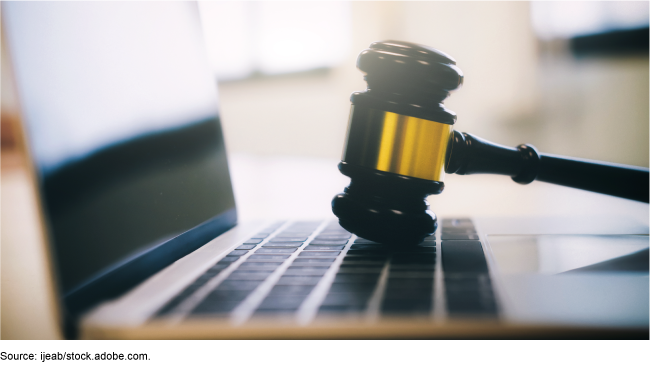Sex Trafficking: Online Platforms and Federal Prosecutions
Fast Facts
The internet has made it easier for sex traffickers to exploit victims and connect with buyers. Traffickers often use social media and these 3 types of platforms:
- Advertising (classified ad sites for sex services)
- "Hobby board" (review sites for sex services)
- "Sugar dating" (dating sites that include commercial arrangements)
In 2018, Congress passed a law to hold online platform providers accountable for prostitution and trafficking facilitated by their platforms. But, federal prosecutors say they have only used the law once because it is new and they've had success using other laws to prosecute such offenses in the past.

Highlights
What GAO Found
Two events in April 2018 disrupted the landscape of the online commercial sex market. First, federal authorities seized the largest online platform for buying and selling commercial sex, backpage.com. Second, the Allow States and Victims to Fight Online Sex Trafficking Act of 2017 (FOSTA) was enacted. These events led many who controlled platforms in this market to relocate their platforms overseas. Additionally, with backpage.com no longer in the market, buyers and sellers moved to other online platforms, and the market became fragmented.
From 2014 through 2020, the Department of Justice (DOJ) brought at least 11 criminal cases against those who control platforms in this market, including three cases against those who control backpage.com, as shown below.
Federal Criminal Cases Brought against Those Who Control Platforms in the Online Commercial Sex Market Under Various Laws Including FOSTA (from 2014 through 2020)

Note: Funds targeted by DOJ represents funds in accounts that have been seized, are subject to potential forfeiture, or have been ordered to be forfeited. GAO uses the term “at least” because there is an unknown amount of funds in many accounts. Funds in cryptocurrency are expressed in the equivalent of U.S. Dollars.
The current landscape of the online commercial sex market heightens already-existing challenges law enforcement face in gathering tips and evidence. Specifically, gathering tips and evidence to investigate and prosecute those who control or use online platforms has become more difficult due to the relocation of platforms overseas, platforms' use of complex payment systems, and the increased use of social media platforms.
Criminal restitution has not been sought and civil damages have not been awarded under section 3 of FOSTA. In June 2020, DOJ brought one case under the criminal provision established by section 3 of FOSTA for aggravated violations involving the promotion of prostitution of five or more people or acting in reckless disregard of sex trafficking. As of March 2021, restitution had not been sought or awarded. According to DOJ officials, prosecutors have not brought more cases with charges under section 3 of FOSTA because the law is relatively new and prosecutors have had success using other criminal statutes. Finally, in November 2020 one individual sought civil damages under a number of constitutional and statutory provisions, including section 3 of FOSTA. However, in March 2021, the court dismissed the case without awarding damages after it had granted defendants' motions to dismiss.
Why GAO Did This Study
Online marketing and communication platforms can enable sex trafficking—the commercial sexual exploitation of adults through force, fraud or coercion, or children under the age of 18 (with or without force, fraud, or coercion)—by making it easier for traffickers to exploit victims and connect with buyers.
Section 3 of FOSTA established criminal penalties for those who promote or facilitate prostitution and sex trafficking through their control of online platforms. It also allows for those injured by an aggravated violation involving the promotion of prostitution of five or more people or reckless disregard of sex trafficking to recover damages in a federal civil action. It also makes federal criminal restitution mandatory for aggravated offenses contributing to sex trafficking.
FOSTA includes a provision for GAO to provide detailed information on restitution and civil damages. This report examines: (1) DOJ enforcement efforts against online platforms that promote prostitution and sex trafficking, from 2014 through 2020; and (2) the extent to which criminal restitution and civil damages have been sought and awarded for aggravated violations under section 3 of FOSTA.
GAO reviewed federal criminal cases brought against those who controlled platforms in the online commercial sex market from 2014 through 2020; visited a selection of online platforms in this market; and conducted a legal search to identify criminal and civil cases brought pursuant to section 3 of FOSTA. GAO also interviewed DOJ officials and representatives from third parties.
For more information, contact Gretta L. Goodwin at (202) 512-8777 or goodwing@gao.gov.
